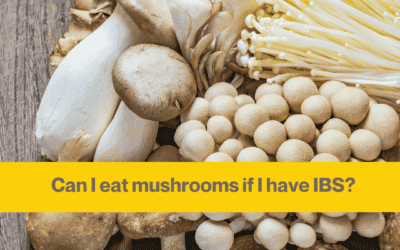If you’re managing Irritable Bowel Syndrome (IBS), navigating dietary choices can be a daunting task. For many individuals, the mere thought of indulging in a scoop of ice cream can evoke a mixture of desire and apprehension. Can you eat ice cream on the low FODMAP diet?
Personally I’m not a big fan (never have been!) but I’m kind of an odd one out.
Ice cream, with its creamy texture and sweet taste, is a comfort food for many people. However, if you’re like my clients with IBS, the consequences of eating ice cream can sometimes outweigh the pleasure!
In this comprehensive guide, I’ll explore ice cream and its compatibility with the low FODMAP diet, lactose intolerance, and IBS management.
Ice cream on the low FODMAP diet
The low FODMAP diet has a well tested dietary intervention for managing symptoms of IBS.
FODMAP stands for Fermentable Oligosaccharides, Disaccharides, Monosaccharides, and Polyols. These are a group of carbohydrates that are poorly absorbed in the small intestine. Because of this malabsorption, FODMAPs can trigger gastrointestinal symptoms like bloating, gas and diarrhoea in susceptible individuals.
Not everyone with IBS will react to all these different FODMAPs. This means you might be ok with lactose. Even big portions.
Is ice cream high FODMAP?
Ice cream, with its combination of milk and sugar, typically contains lactose. It also has high levels of sugar – both of which are potential triggers for IBS symptoms.
Lactose levels in ice-cream might vary from 2-6g per portion.
However, if you’re an ice cream lover following the low FODMAP diet all is not lost!
There are options available that cater to individuals with sensitive digestive systems. You can make clever choices when selecting ice cream varieties to ensure they align with the principles of the low FODMAP diet.
Lactose-free ice cream
For individuals with lactose intolerance, traditional dairy-based ice cream can be a recipe for an IBS flare up.
Lactose, the sugar found in milk, can cause bloating, gas, and abdominal pain. This is because some people lack the enzyme lactase needed to digest it effectively. Read more about dairy in this blog post – Dairy in the low FODMAP diet.
Lactose-free ice cream by removing or reducing lactose content, might be easier on your digestion, but you’d need to experiment with small portions.
Fed up of your restrictive IBS diet?
Low FODMAP ice cream
In recent years, the demand for low FODMAP products or dairy free ice cream for vegans has grown significantly. So, you might find more products in the shops than 10 years ago.
How much ice cream can I eat on the low FODMAP diet?
The Monash University guide to foods classifies two thirds of a scoop of vanilla ice cream as low FODMAP. This isn’t much, although 2 level scoops is only moderate in FODMAPs.
Other triggers in ice cream
Apart from lactose other triggers for people with IBS could be the high sugar content often present in traditional ice cream varieties.
Sugar in ice cream can upset digestion
Excessive sugar intake can disrupt the balance of bacteria in the gut, leading to bloating, gas, and discomfort for individuals with IBS.
Watch out for sweeteners
Additionally, some artificial sweeteners used in low-calorie or sugar-free ice creams, such as sorbitol and mannitol, are known polyols and can trigger gastrointestinal distress in sensitive individuals.
Ice cream flavourings could trigger IBS
Another potential culprit is the presence of additives and preservatives. These additives, including stabilizers, emulsifiers, and artificial flavours, may not agree with everyone’s digestive system. Emulsifiers are often used in non-dairy products to make them feel more creamy.
Considering these factors, individuals with IBS should carefully read ingredient labels and opt for simpler, more natural ice cream varieties whenever possible to minimize the risk of triggering symptoms and maximize enjoyment.
In conclusion
While ice cream may seem like an indulgence best avoided for those with IBS, there are actually options available that cater to sensitive digestive systems. Whether it’s lactose-free varieties, low FODMAP options, or homemade alternatives, you can still enjoy the sweet, creamy goodness of ice cream without sacrificing digestive comfort.
As with any dietary choice, moderation and mindful consumption are key.
Experimenting with different flavours and brands can help you find your perfect match while keeping symptoms at bay.
In conclusion, ice cream can still be a treat you enjoy.
I can help with your IBS diet
If you want help figuring out your IBS triggers, start your Gut Reset with me over 3 months to find a diet that works for you. Just set up a free call to discuss what you need some help with. Email info@goodnessme-nutrition.com

IBS Nutritionist
Hi, I'm Anna Mapson, registered Nutritional Therapist.
I help people with IBS and SIBO get control of unpredictable gut symptoms to find long term relief from painful and embarrassing IBS without restrictive dieting.
I can help you to:
- understand your digestion better, so you recognise your triggers
- eat a well balanced diet, with tasty meals that are simple to prepare
- reintroduce your trigger foods so you can get back to enjoying food again
Find more about my 3 month 1:1 Gut Reset programme.
Is psyllium husk good for IBS?
If you’re anything like most of my clients you’ve researched all the typical IBS supplements and you might well have seen psyllium husk advertised. Or it could be recommended by your doctor. This blog post will explain how psyllium husk can be used by people with IBS....
Are mushrooms bad for IBS?
Have you ever considered mushrooms a trigger for your IBS? This blog post covers all you need to know to decide if you should keep eating them. The benefits of eating mushrooms with IBS Mushrooms are fungi and are very nutritious. Different species have different...
Which sweeteners are low FODMAP?
Living with Irritable Bowel Syndrome (IBS) often means making significant changes to your diet to avoid triggering symptoms. One common question I get is, “Which sweeteners are low FODMAP?”. In this article, I'll explore the various sweeteners available, their FODMAP...






